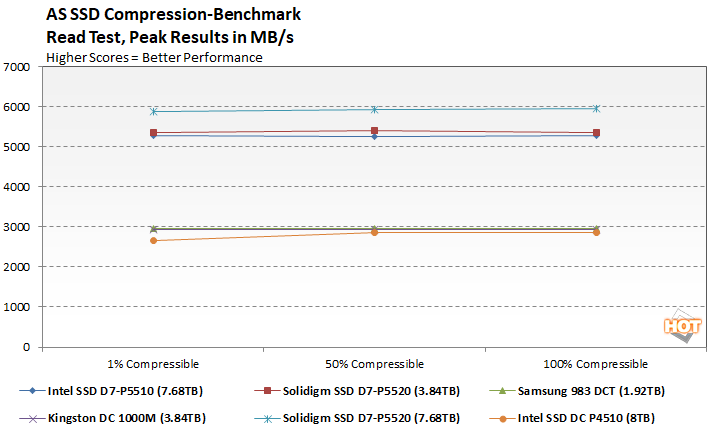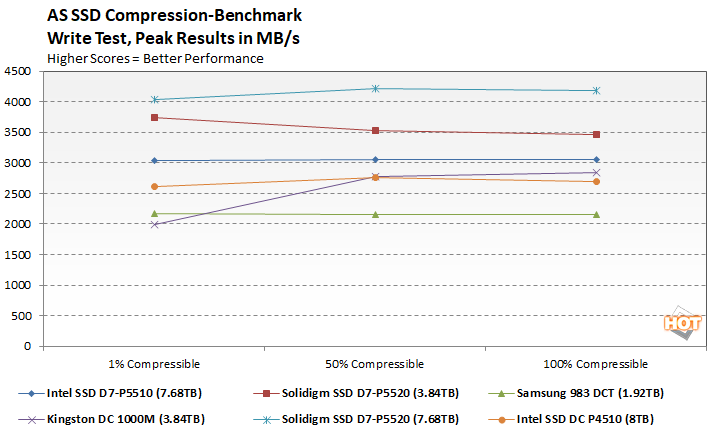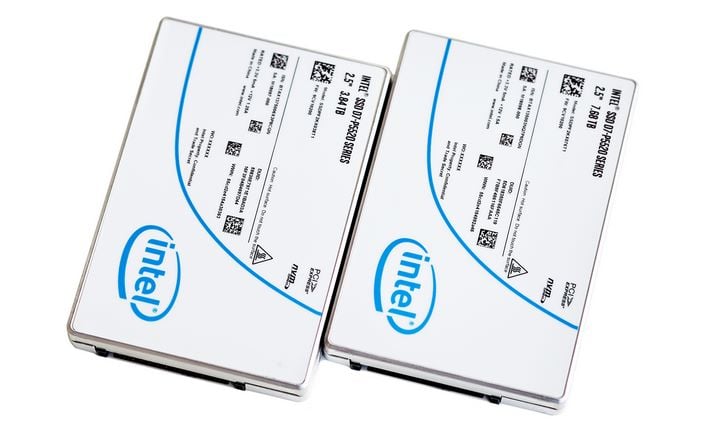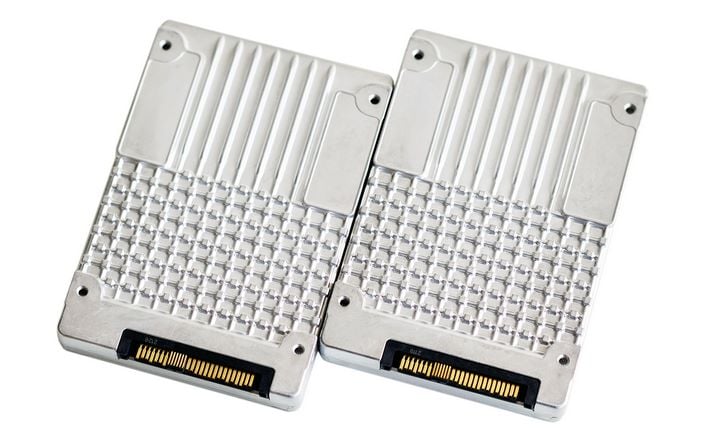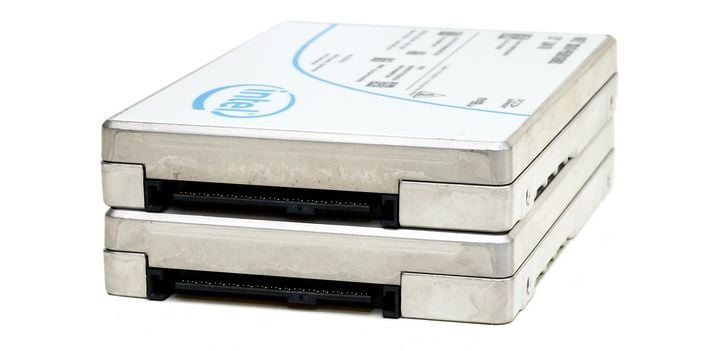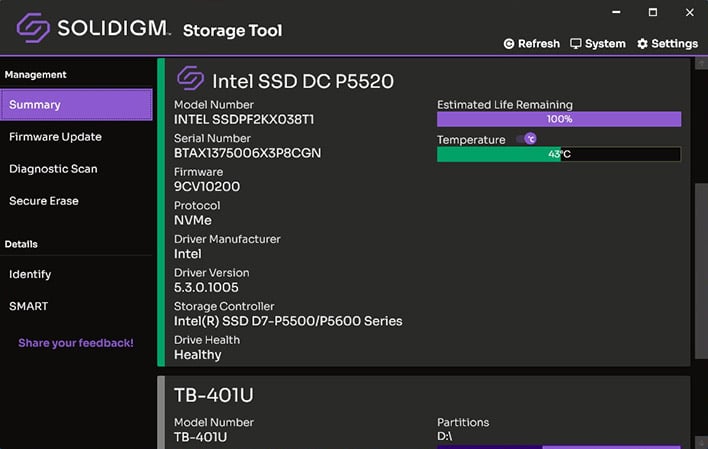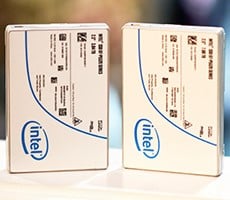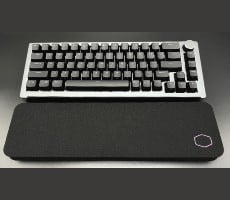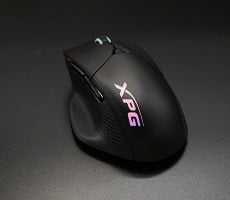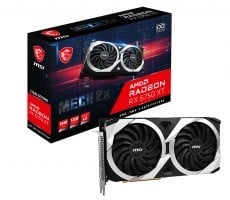Solidigm SSD D7-P5520 Review: Big, Fast NVMe Cloud Storage
Rest assured, however, SK Hynix and Solidigm plan to take the solid state storage business in their own unique direction. In the consumer space, SK Hynix has some of the better SSDs currently available. We expect a similar intensity and effort to permeate the enterprise and data center storage business, though this SSD we're looking at here today was already well into development when the acquisition took place.
With all that said, let’s take a close look at the Solidigm SSD D7-P5520 in a couple of capacities, both 7.68TB and 3.84TB. The specs for these drives (and higher capacity models in the line-up) differ slightly, but improve upon the previous gen in a few ways...
Solidigm SSD D7-P5520 Specifications & Features
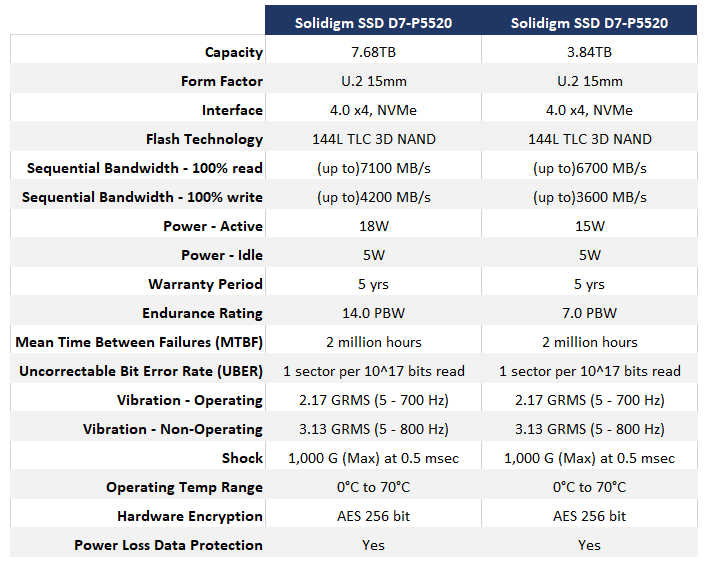
The Solidigm SSD D7-P5520 series drives we’ll be showing you here today leverage the common U.2 2.5” x 15mm form factor and will be offered in capacities from 1.92TB all the way on up to a whopping 15.36TB. There are also E1.S 9.5MM and 15MM drives in the family, but their capacities top out at 7.68TB. As mentioned, the specs vary somewhat between capacities and form factors, but the Solidigm website has an easy compare feature available, should you be considering its various form factors.
At the core of these drives is a proprietary, native, PCIe Gen 4 NVMe controller paired to second-gen 144-layer TLC 3D NAND memory and freshly-tuned and optimized firmware, to provide improved latency and throughput with more consistent QoS across a variety of workloads. Moving to the latest144-layer 3D TLC NAND flash memory on these drives not only allows Solidigm to provide high capacities and improve the maximum storage density per server, but it also minimizes power consumption; peak power under load is ~18 watts with the 7.68TB drive (15 for for the 3.84TB model). And both of these drives idle at approximately 5 watts.
Inside their aluminum chassis, which also act as heatsinks thanks to their integrated fins, these drives feature some DRAM (8GB in the case of the 7.68GB model), in addition to the controller and NAND, and capacitors that enable full power-loss protection. Like previous-gen, data center-targeted SSDs from Intel, D7-P5520 drives offer end-to-end protection from silent data corruption and include 5-year warranties, with endurance ratings of 1 full drive write per day (up to 14 PBW for the 7.68TB drive). They support AES-256 bit encryption as well.
In terms of throughput, the higher capacity 7.68TB SSD D7-P5520 is rated for 7.1GB/s reads with 4.2GB/s writes. The 3.84TB drive clocks in at 6.7GB/s (reads) and 3.7GB/s (writes) As you’ll see in just a bit, the drives are absolutely capable of hitting and even exceeding these speeds, so Solidigm is being somewhat conservative with their rated specs right out of the gate.
As you’d expect from a data center focused products such as this, Solidigm offers management, update, and maintenance software for the D7-P5520 series, for both Windows and Linux. The Solidigm Storage Tool (for Windows) offers a modern GUI, with a few diagnostic and maintenance tools to keep the SSDs performing optimally. This is actually a universal tool that works with any Intel or Solidigm data center SSD (Intel Optane requires the Intel MAS GUI), which gives users the ability perform such operations as updating the firmware on the drive, secure erasing it or sending a TRIM command to the drive with the SSD Optimizer to clean-up cells that are no longer in use.
Solidigm SSD D7-P5520 Test Setup And Benchmarks
Under each test condition, the SSDs tested here were installed as secondary volumes in our testbed, with a separate drive used for the OS and benchmark installations. Our testbed's motherboard was updated with the latest BIOS available at the time of publication and drives were left blank without partitions for some tests, while others required them to be partitioned and formatted. Windows firewall, automatic updates, and screen savers were all disabled before testing and Windows Quiet Hours / Focus Assist was enabled to prevent any potential interruptions.
In all test runs, we rebooted the system, ensured all temp and prefetch data was purged, waited several minutes for drive activity to settle and for the system to reach an idle state before invoking a test. All of the drives featured here were tested with their own NVMe drivers installed where possible / available, but the default Microsoft NVMe driver was used when a proprietary driver was unavailable. Also note, this is only the second PCIe Gen 4 data center SSD we've gotten our hands on, so the bandwidth available to the Solidigm SSD D7-P5520 is effectively double that of the PCIe Gen 3 drives we used for reference comparisons.
IOMETER Benchmarks
As we've noted in previous solid state storage articles, though IOMeter is clearly a well-respected industry standard benchmark too, we're not enamored with it for testing SSDs. The fact of the matter is, though our results with IOMeter scale, it is debatable whether or not certain access patterns, as they are presented to and measured, actually provide a valid example of real-world performance. The access patterns we tested may not reflect your particular workload, for example. That said, we do think IOMeter is a reliable gauge for relative available throughput, latency, and bandwidth with a given storage solution. In addition, there are certain higher-end workloads you can place on a drive with IOMeter, that you can't with most other storage benchmark tools available currently.In the following tables, we're showing two sets of access patterns; a custom Workstation / Server pattern, with a 128K transfer size, consisting of 80% reads (20% writes) and 80% random (20% sequential) access and a 4K access pattern with a 4K transfer size, comprised of 67% reads (33% writes) and 100% random access. Queue depths from 1 to 32 were tested.
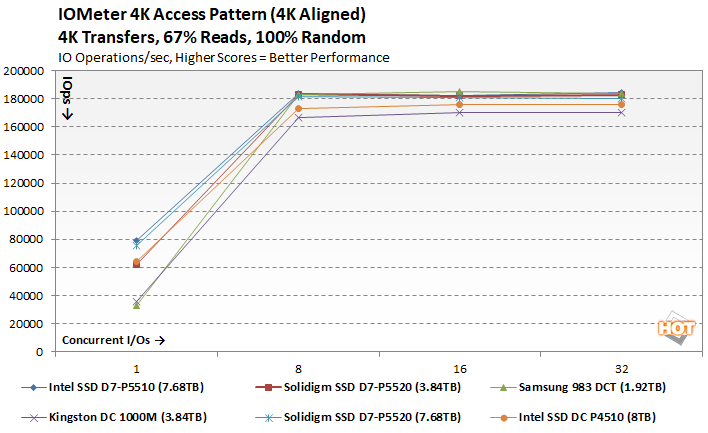
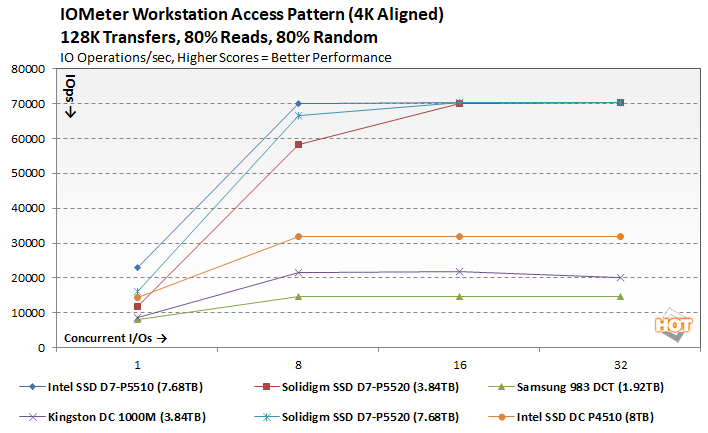
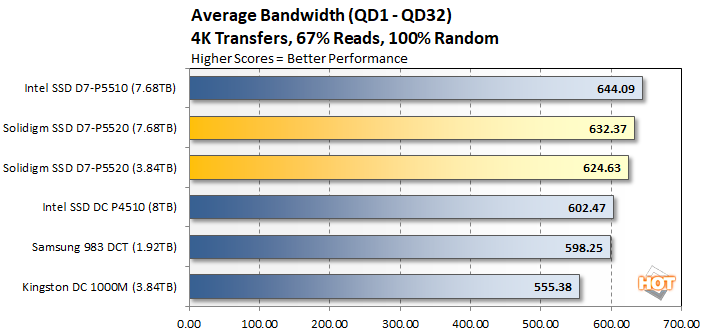
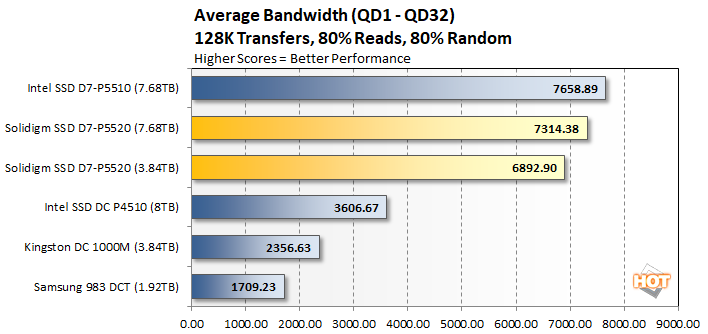
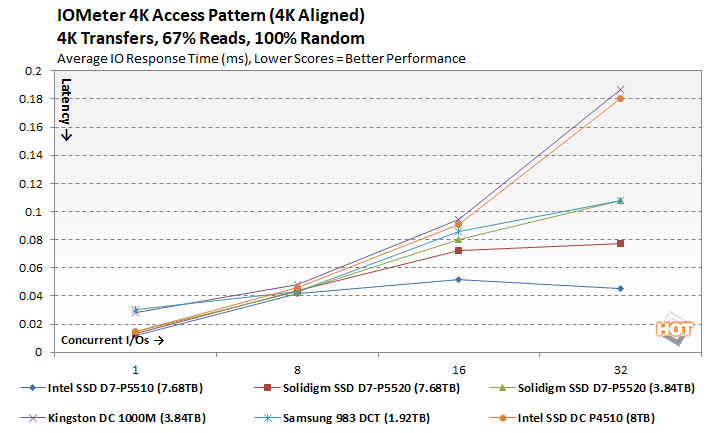
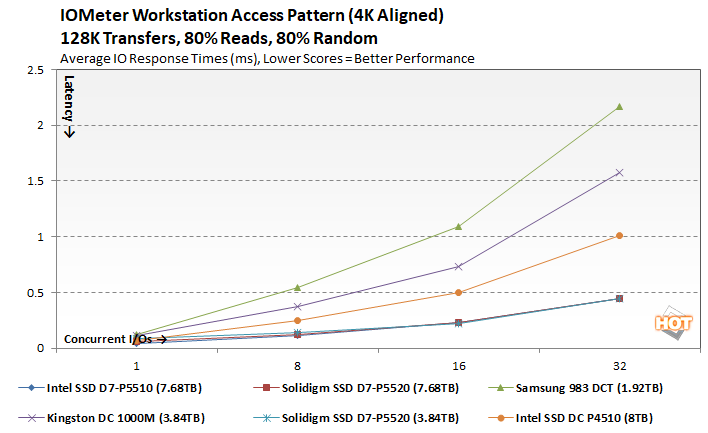
ATTO Disk Benchmarks: Bandwidth & IOs
ATTO is straightforward disk benchmark that measures transfer speeds across a specific volume length. It measures raw transfer rates for both reads and writes and graphs them out in an easily interpreted chart. We chose .5KB through 64MB transfer sizes and a queue depth of 4 over a total max volume length of 256MB. ATTO's workloads are sequential in nature and measure bandwidth and IOs, rather than response times, access latency, etc.
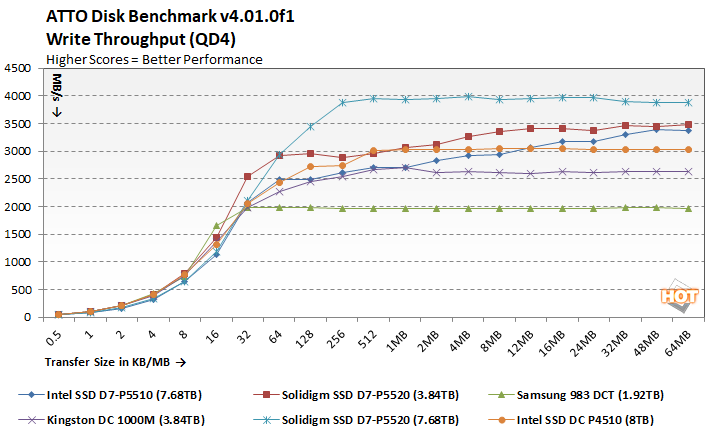
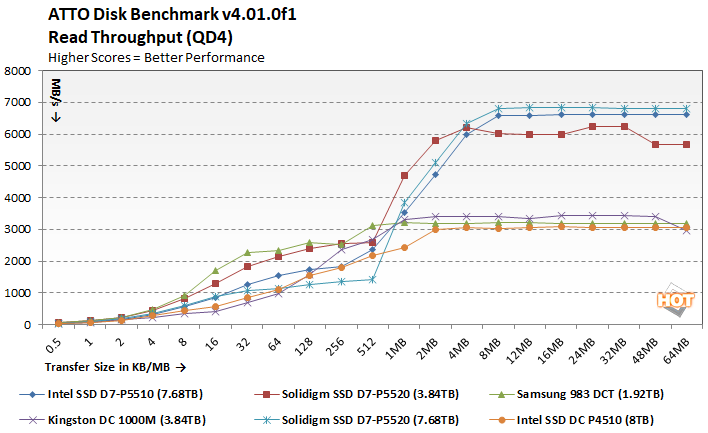
Apologies for swapping their positions in these charts (the capacities of the Solidigm drives are swapped here, versus the IOMeter scores). Regardless, performance is once again very good, with the 7.68TB Solidigm SSD D7-P5520 leading the pack with both reads and writes, with the larger transfer sizes.
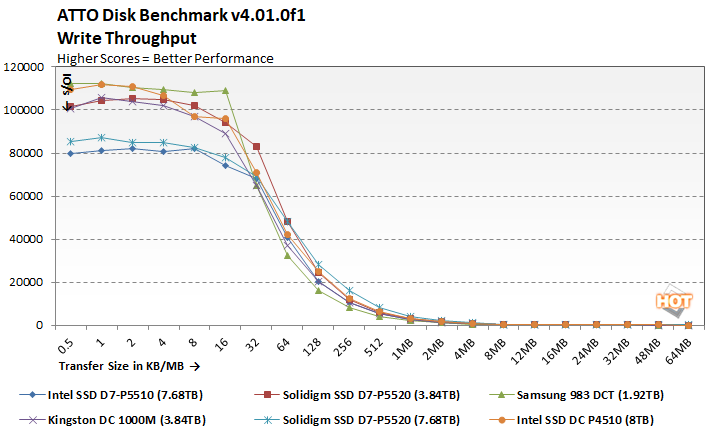
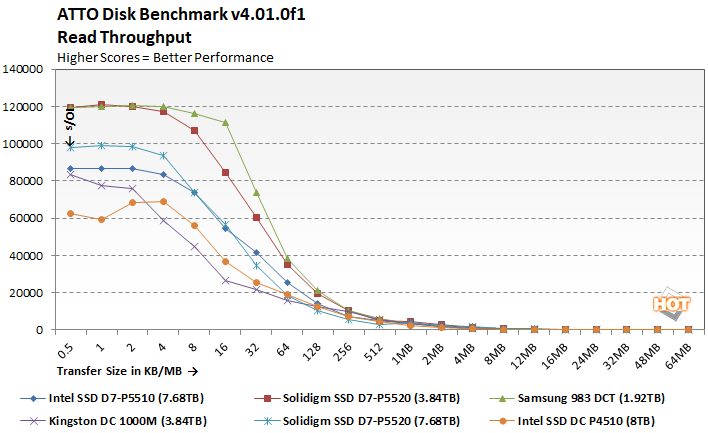
Peak IOs across the various transfer sizes are also right in the mix with all of the drives we tested. Samsung's drives are particular strong here, but no one model really runs away from the rest.
SiSoft SANDRA Physical Disk Test
Next we used SiSoft SANDRA, the the System ANalyzer, Diagnostic and Reporting Assistant for some quick tests. Here, we used the Physical Disk test suite and provide the results from our comparison SSDs. The benchmarks were run on clean drives that lacked any partitions. Read and write performance metrics are detailed below.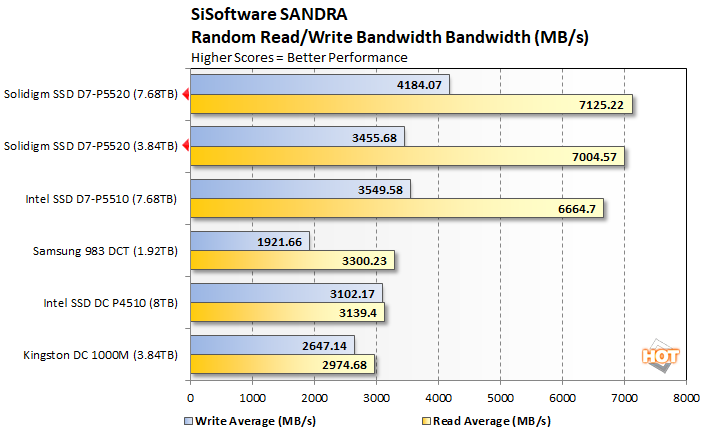
AS-SSD Compression Benchmark
Here we ran the Compression Benchmark built-into AS SSD, an SSD specific benchmark being developed by Alex Intelligent Software. This test is interesting because it uses a mix of compressible and non-compressible data and outputs both Read and Write throughput across the drive. We only graphed a small fraction of the data (1% compressible, 50% compressible, and 100% compressible), but the trend is representative of the benchmark’s complete results.